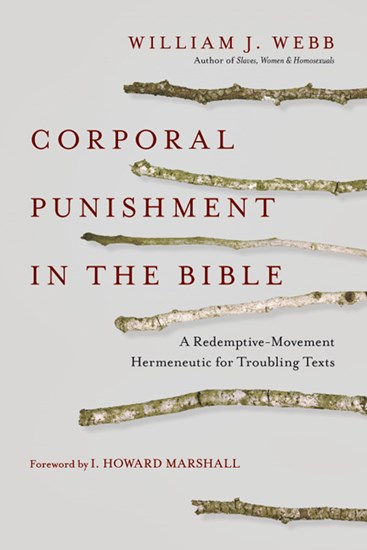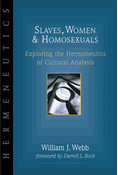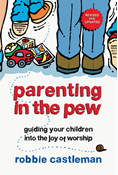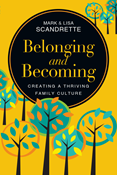
|
Corporal Punishment in the Bible
paperback
|
- Length: 192 pages
- Published: July 21, 2011
- Imprint: IVP Academic
- Item Code: 2761
- ISBN: 9780830827619
-
Other Retailers:
Amazon*
*affiliate partner
William Webb confronts those often avoided biblical passages that call for the corporal punishment of children, slaves and wrongdoers. How should we understand and apply them today? Are we obligated to replicate those injunctions today? Or does the proper interpretation of them point in a different direction?
Webb notes that most of the Christian church is at best inconsistent in its application of these texts. But is there a legitimate basis for these lapses?
Building on the findings of his previous work, Slaves, Women and Homosexuals, Webb argues that the proper interpretation and application of these texts requires ascertaining their meaning within the ancient cultural/historical context. In recognizing the sweep of God?s redemptive purposes already evident in the Old Testament and fulfilled in the New, we remain truly biblical.
"The implications of this book go far beyond disturbing ancient requirements of physical punishment and present-day challenges of child discipline. I wish everyone who is interested in doing grammatical-historical interpretation and application of the Scriptures could read the meticulous way William Webb works to find and unfold the Bible's own ultimate ethic. As many of us look for wisdom in moving forward, the author finds important conservative precedent in some surprising, yet already widely accepted places."
"What does it mean to be 'biblical'? Bill Webb exposes just how easy it is for people to claim this without paying close attention to what the Bible actually says. He provides a case study in the redemptive-movement method of discerning and applying the ethical challenge of Old Testament texts. Since the corporal punishments of the Old Testament are among its more morally disturbing features, his reflection on this issue is both thorough and courageous. If none of us, one hopes, is doing or advocating 'what the Bible actually says' in exercising parental discipline, then how can we reach a principled theory and practice in that area that can still be defended as 'biblical' with interpretive integrity? This is a book that is both theologically challenging and yet realistically earthed in the mundane and moving experience of the Webb family. It describes a personal hermeneutical journey shared with fellow parents, as well as a hermeneutical conclusion offered to the academy. At both levels it deserves careful listening and response."
"Webb challenges the premises of the traditional spanking position at a hermeneutical level and exposes its failure to come to grips with what the Bible actually says on the subject. He shows how most advocates of spanking have actually softened the Bible's teaching on the subject, and he commends them for doing so. Yet he mounts a convincing case for following that trajectory and going one step further, building his position on a redemptive-movement hermeneutic that most Christians already use when arguing for an antislavery viewpoint. Webb's logic is tight and his insights penetrating. But beyond this, perhaps what is most impressive is the humble, irenic spirit he displays as he explains how he arrived at his position and addresses those who disagree with him. It will be interesting to see how the prospanking position responds to this thoughtful and profound challenge. This reviewer suspects that many will find Webb's book a breath of fresh air."
"When I read Slaves, Women and Homosexuals, I remember thinking, I wish I could have written a book like this. Now I had the same sense reading Corporal Punishment in the Bible. This book is about exercising parental discipline biblically by, paradoxically, disobeying the concrete specific instructions in the Bible (in seven ways!) that speak to this subject. Contemporary pro-spankers have, indeed, already done this but do not adequately justify how they could abandon an 'on the page' grammatical-historical exegesis of the corporal punishment texts to get there. In collaboration with Marilyn, his eminently qualified wife and mother of their three children, Bill includes chapters on the why and how of alternative discipline methods that I wish I could have applied when our children were in their preteens. I loved reading this book, not only for the details of the topic he addresses, but for the countless parallels, paradigms and ponderings that popped into my head as I considered the implications of being led by the Spirit for so many other aspects of biblical teaching."
"Webb wrestles gallantly with two difficult issues: (a) How should Christians read biblical texts that seem to advocate violent responses to situations calling for discipline? and (b) How should Christian parents handle difficult disciplinary situations involving their children? The author handles the biblical evidence carefully and exhibits great grace toward those who read and apply the evidence differently. Applying his 'redemptive-movement' hermeneutic persuasively to a specific ethical issue, he challenges readers to consider alternatives to corporal punishment in the home. This is a must-read for parents with young children, and for theologians who seek to apply the theology of texts from another time and another world to the contemporary context."
"To spank or not to spank is not a question from Shakespeare but one most parents ask. Thinking through what it means to parent well biblically is a key Christian concern. This book takes you through the paces well autobiographically and will cause you to think about what you do and why. It will also cause you to reflect on how the Bible teaches us. Both are great lessons for parents and believers."
"How do we apply to our lives biblical texts written to ancient audiences in radically different social and cultural contexts than our own? That is the real question Professor Webb wrestles with in this engaging and thoughtful book. This volume presents a compelling case that contemporary pro-spankers are not adopting a more "biblical" approach to discipline, but are rather going beyond the Bible to recontextualizing biblical texts on the basis of contemporary pediatric, social and psychological concerns. In other words, they are (without realizing it) adopting a redemptive-movement hermeneutic not so different from the one Webb advocates. This book should be read by every Christian interested in child raising and discipline. More importantly, it should be read by every Christian interested in how to read and apply God's Word in our rapidly changing world."
"William Webb is becoming one of evangelicalism's finest teachers of how to 'live the Bible' in our world. What he teaches us is simple: each text in the Bible is embedded in a historical context, and the only way to read the Bible responsibly is to see what the Bible was saying in that historical context. When it comes to living out the Bible in our world, we watch how God teaches his people to redeem those historical contexts. This book applies that method to corporal punishment with stunningly redemptive conclusions. Every parent and every pastor, in that order, needs to read this book before either lifts a hand or teaches others to lift a hand. I pray this book will flourish."
CONTENTS
Foreword by I. Howard Marshall
Acknowledgments
Abbreviations
Introduction: A Troubled Christian Soul
Part I: Troubling Texts
1Biblical Texts, Ethical Dilemmas and Hermeneutical Inconsistencies
Part II: A Redemptive-Movement Hermeneutic
2 The Slavery Texts: A Redemptive-Movement Model
3 The Rod and Whip Texts: A Biblical Basis for Going Beyond
Part III: Lingering Questions
4 What About Adult Corporal Punishment?
5 What About Using Only Noncorporal Methods for Children?
Conclusion: Dare to Read the Bible Differently
Postscript: An Unplanned Parenting Journey
Appendix: A Response to Andreas Köstenberger
Bibliography
Author Index
Scripture Index






